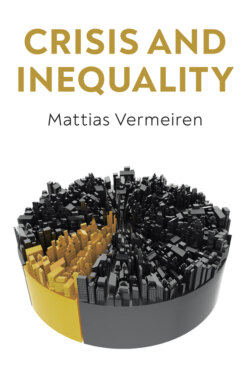Читать книгу Crisis and Inequality - Mattias Vermeiren - Страница 13
1Rising Inequality in Advanced Capitalism
ОглавлениеIn this chapter we will provide a brief overview of some issues related to rising inequality in advanced capitalist countries. First, how is it measured? There are many ways that inequality can be measured, but we will restrict ourselves to those measures that are most frequently used in contemporary debates on inequality: (1) measures of personal income distribution like the Gini index and the shares of different groups in national income; (2) measures of functional income distribution like the labour and capital share in national income; (3) measures of wealth distribution. By all measures, economic inequality has risen sharply in many advanced capitalist economies. Nevertheless, significant cross-national differences can be observed in terms of both the level of inequality and the evolution of inequality since the 1980s: patterns of inequality have been shaped by national varieties of capitalism, with the Anglo-Saxon LMEs displaying higher inequality and growth of inequality than North and West European CMEs.
Second, how can rising inequality be explained? Cross-national divergences in patterns of inequality suggest that the neoclassical interpretation remains inadequate. Neoclassical economists have emphasized exogenous market forces like skill-biased technological change (SBTC) and globalization to explain the rise in inequality. Since advanced capitalist economies have more or less equally been exposed to these market forces, they fail to clarify why the trajectory of inequality has been so markedly different in the Anglo-Saxon countries and the other advanced countries. So while technological change and globalization may act as powerful forces for income inequality, continued cross-national diversity suggests that other factors influence both the magnitude and the rate of change in inequality and top income shares. From a political economy perspective, the effects of technological change and globalization on the distribution of income and wealth in the advanced economies have been shaped and mediated by a variety of government policies and economic institutions that will be examined in subsequent chapters.
Finally, why does rising inequality matter? A growing body of research in social sciences and political economy suggests that excessive inequality can have different kinds of undesirable social and political effects. While it is important to be aware of these effects, the main focus of this book will be on another adverse consequence of rising inequality: financial instability. There is a growing consensus that the rise in income and wealth inequality was one of the deeper, structural causes of the global financial crisis of 2007–9. In this chapter we briefly discuss the main mechanisms behind this connection and sketch out why heterodox political economy is more adequate to understand the causes and consequences of rising inequality than neoclassical economics.
